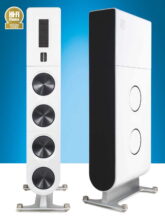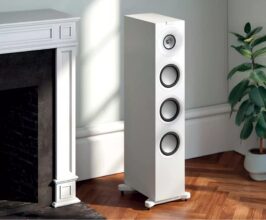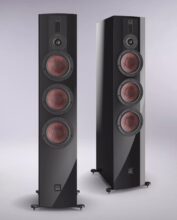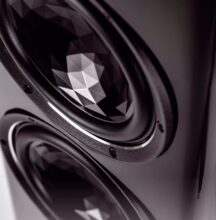KEF Q950 Review
Uni-Q stands for evolution and the ideal of a point-source speaker. While the coaxial drivers have continuously matured over time, KEF keeps things simple with the Q950. Tested at 1,550 euros per pair.
by Stefan Schickedanz
Introduced in 1990, KEF’s Q series is one of the unassuming yet powerful Hi-Fi speaker lines with a classic design. The current lineup consists of three floor-standing models: the KEF Q950, Q750, and Q550, as well as two bookshelf speakers: the Q350 and Q150. For surround sound setups, there’s also the Q650 center and the Q50a Dolby Atmos module. This series covers a wide range of applications. In our test, we examined the flagship model, which is priced at an accessible 1,550 euros per pair.
Big, black, and powerful: The KEF Q950 skips the frills. It focuses entirely on sound performance.
For the price, you get a lot of speaker. The 2.5-way floor-standing speakers stand 1.12 meters tall and weigh a solid 21 kilograms. KEF doesn’t take any design risks here, but the Q-series’ clean, angular design is so simple that it remains timeless. If you don’t appreciate the look of the five drivers, you’ll need to order the grills separately for about 100 euros, which will cover the baffle of these black or white towers with black fabric. Despite the cost-conscious design of the MDF cabinets, KEF chose not to use plug connectors, which require front-facing holes that compromise the look when the speakers are displayed without covers. Instead, the designers opted for invisible magnetic mounts.
With this new generation, KEF eliminated the metal trims below the coaxial midrange-tweeter driver seen in the previous 7th generation, as well as the silver-colored membranes of the Uni-Q driver. This stealthy look makes the black version of the speakers appear even more understated, although it may not boost their appeal to female buyers, despite the continuation of the Bauhaus-inspired design introduced with the previous series.
To increase the appeal of this British bestseller among audiophiles, KEF has continuously improved its unique Uni-Q coaxial driver over the years. In the Q950, the driver has grown to an impressive size. Its diameter is 20 centimeters, making it not only the largest coaxial driver in the series but in the entire KEF lineup. Even the super-speaker Blade has a Uni-Q driver with only a 13 cm diameter. The growth of the driver, housed in a separate chamber, is due to the fact that the Q950 is a 2.5-way design meant to move serious air in the bass.

With its floor spikes and hand-adjustable height settings, the 2.5-way KEF Q950 stands a full 1.12 meters tall.
Equal Treatment
All the driver membranes, except for the tweeter, have the same diameter, which provides uniform sound dispersion. Of the three lower drivers, only the middle one is active, while the other two are passive radiators. This setup behaves similarly to a bass-reflex design, but with the benefit of preventing midrange frequencies from leaking out and avoiding airflow noise.
The upper mid-bass driver of the Uni-Q chassis features stiffening ribs on its aluminum membrane and uses a completely different surround design compared to the lower bass drivers. To avoid the 20 cm cone from causing too much directivity at higher frequencies, KEF lets the tweeter operate up to 2 kHz. The tweeter has an unusually large 3.8 cm dome. Aluminum gives the dome the necessary stiffness, and a Tangerine Wave Guide (see box) optimizes the frequency response. Any rearward sound is vented through a small tube to eliminate distortion (which other British manufacturer does that remind you of?). Over the years, Uni-Q has only gotten better, offering many advantages. It has become a signature feature, much like Bowers & Wilkins’ now-retired yellow Kevlar membranes.
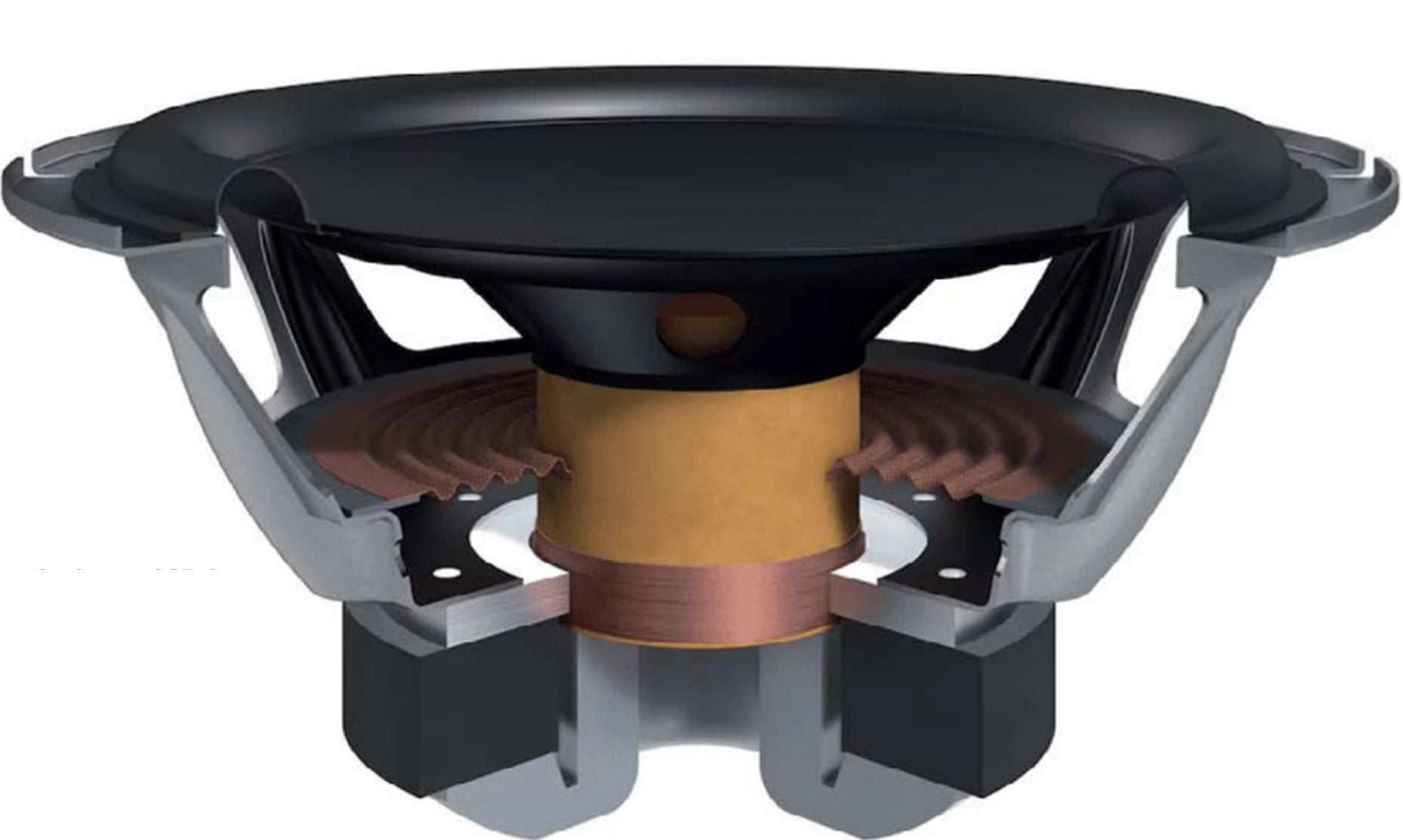
Aerodynamically optimized baskets and pole core ventilation are key features of the mid-bass driver, supported by two passive radiators.
In our listening test, the focus was on tonal colors, and these understated black boxes had a lot to offer. The warm mids were complemented by fresh, well-resolved highs, adding a touch of color. The harmony and range of the sound didn’t fall short compared to more expensive speakers. However, with some recordings, the highs could feel a bit too prominent. The Q950 truly shined with live recordings like David Gilmour’s “Live at Pompeii.” On “Wish You Were Here,” it brought out the detail in the guitar strings and clearly separated Gilmour’s vocals from the audience chorus. Its bass authority—remarkably developed for this class—was on full display with tracks like “Time” and “Money.” KEF has created a well-rounded, mature speaker in the Q950.
Decades of Refinement: KEF’s Uni-Q is Unique
Coaxial midrange-tweeter drivers come very close to the ideal of a point-source speaker. However, having the midrange and tweeter on the same axis poses several technical challenges. One of these is the Doppler effect, where the movement of the midrange membrane modulates the sound emitted by the concentric tweeter.
Horn effects can also be an issue. KEF has refined its long-evolved Uni-Q coax driver with specially shaped metal membranes and the Tangerine Wave Guide.
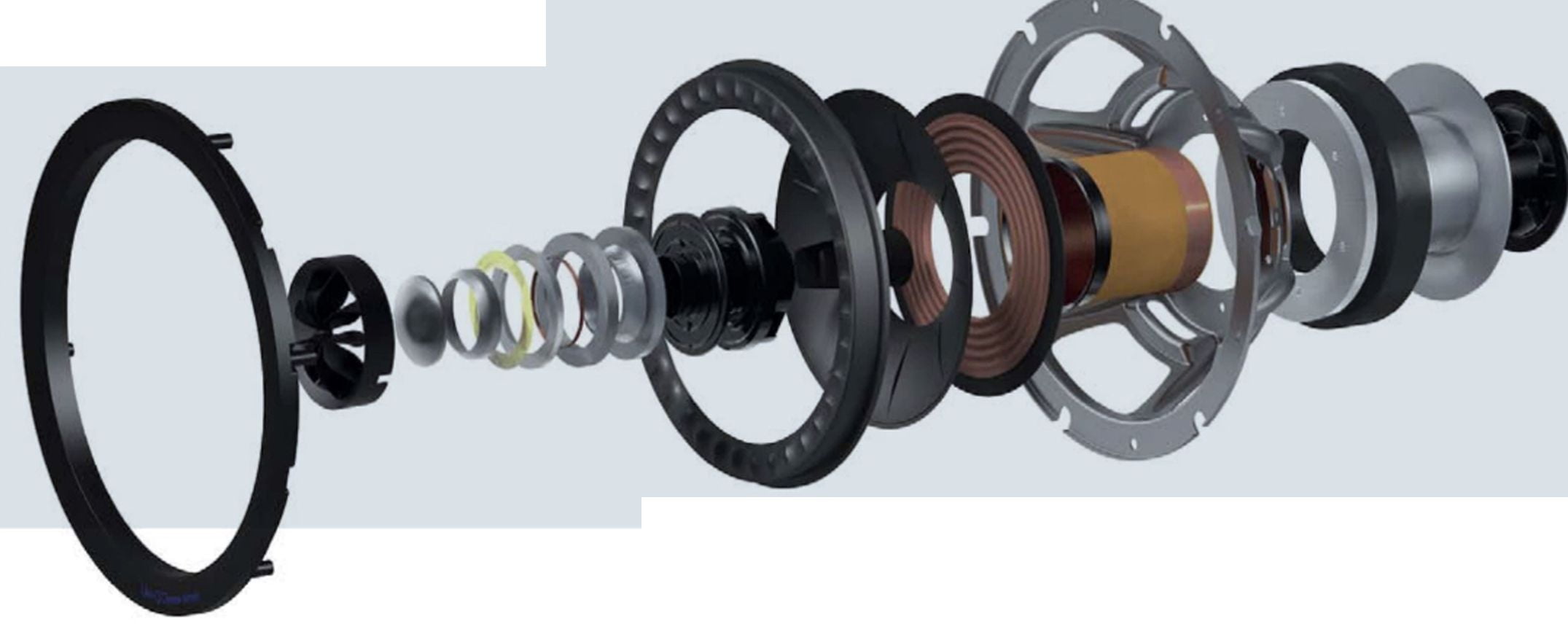
Specifications
www.kef.com
Dimensions (WxHxD): 111.6 x 35.7 x 32.8 cm
Weight: 20.6 kg
Measurement Diagrams
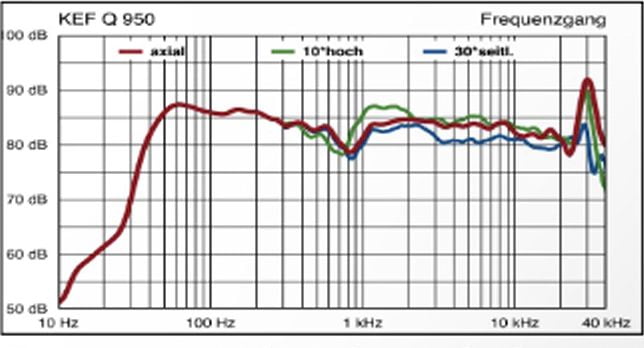
Frequency Response & Impedance: Emphasized deep bass, slight midrange dip, otherwise balanced with consistent directivity
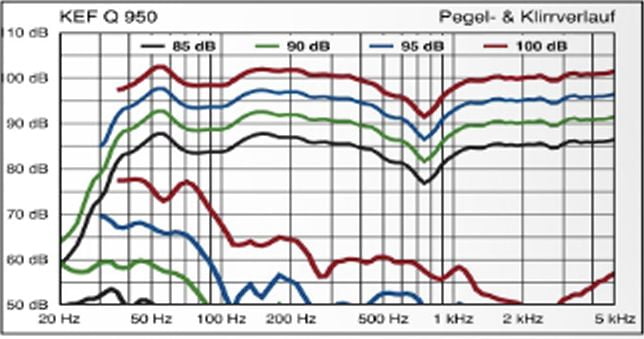
Volume & Distortion at 85-100 dB SPL: Exceptionally low distortion, rising slightly faster only in the upper bass
Lower Cutoff Frequency -3/-6 dB: 38/35 Hz
Maximum Output: 104 dB
Practicality and Compatibility
Amplifier Compatibility Diagram
Moderately high power demand, suitable for amplifiers of medium stability
Voltage: 14.8 V
Impedance-A: 13.3-20 ohms
Current Requirement: 4.5A
Room Acoustics and Placement
Aim towards the listener, maximize distance from walls in rooms with resonant modes
Listening Distance: 1m 5m
Wall Distance: 0m 1.5m
Reverberation Time: 0.2s 0.8s
Verdict
In terms of design, the Q950 is no surprise, but its sound is. Rarely do you get so much speaker for under 1,600 euros. Alongside its balanced sound and the typical coaxial spatial imaging, the resolution and deep, rich bass are impressive.
Naturalness: 8/10
Detail Resolution: 8/10
Dynamic Range: 7/10
Bass Quality: 9/10
Imaging: 7/10
Overall Rating 8.1/10
Price/Performance Outstanding
When you purchase through links on our site, I may earn an affiliate commission. Here’s how it works.
KEF speaker review | Kef Q950 vs Martin Logan and others
This video is not sponsored. Please consider purchasing them through the link below if you aren't in the Southern California area.
KEF Q950 Tower Floor Standing Speaker Review| Home Theater and Music | 8 inch Woofers
The KEF Q950 Tower Speaker is a Two and a half way Bass Reflex Speaker. It is for Home Theater and Music. The Q950 by KEF ...









